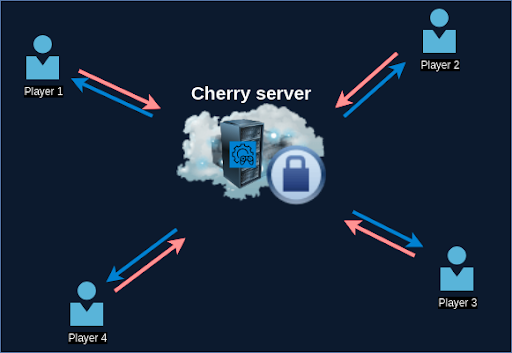What is a Dedicated Game Server and How Does it Work?

#What is a dedicated game server?
A dedicated game server is a standalone machine used exclusively to host multiplayer video games, managing all game logic, data, and connections independently of any individual player's device. As opposed to peer-to-peer hosting, in which the personal computer of one of the players becomes a server, the dedicated servers ensure a stable and centralized working platform that improves the game speed and avoids issues with the other participant's computer. Gaming communities, competitive gamers, and participants who want greater server assurance, lower latency, and a vast array of configurations typically use dedicated servers.
This article will explain what a dedicated game server is, its benefits, the components most commonly used, and what games utilize them. We will also discuss the monetary aspects of running a dedicated gaming server.
#How does a dedicated game server work?
Dedicated game servers operate through a centralized architecture where the server machine, typically housed in a data center, manages all game data, world states, player statistics, and interactions. This setup contrasts sharply with peer-to-peer hosting, where a player's device doubles as a server, distributing connection loads across peers but often causing performance issues when the "host" leaves or experiences network problems. Dedicated servers maintain an always-on environment where the server machine exclusively handles all players' requests, making game states and interactions stable and consistent.
A typical dedicated server setup requires high-performance hardware capable of handling multiple simultaneous player connections, rapid data processing, and real-time event management. Key components include a fast CPU, substantial RAM, reliable storage (often SSDs), and a high-bandwidth internet connection. Efficient networking configurations are essential for quickly connecting players to the server, ensuring minimal latency. Network ports, protocols like TCP or UDP (for rapid packet delivery), and firewall configurations also play crucial roles in maintaining connection quality and server security. Dedicated game servers may utilize load balancers to distribute traffic efficiently, ensuring peak performance even under heavy usage.
Get Full Control Over Your Gaming Server
Cherry Servers' dedicated gaming servers offer exclusive access to hardware resources, high customization, and easy scaling without sacrificing performance.
#Benefits of dedicated game servers
Here are some of the benefits to expect when opting to use a dedicated game server:
- One of the primary benefits of dedicated game servers is their enhanced gameplay performance and stability, which is especially critical for games demanding high responsiveness. Unlike other setups, dedicated servers minimize lag by managing data on a powerful, always-connected machine, resulting in more stable frame rates and lower latency.
- Players enjoy a smooth experience regardless of individual connection quality, as the server handles all interactions without relying on any player's device.
- Specific gaming servers also give administrators greater control for customizing the gaming experience.
- Server owners can change particular game characteristics, like introducing various mods and restrictions or building a particular atmosphere and rules for selected communities.
- Most dedicated servers come with advanced DDoS protection, firewalls, and security protocols to shield them from hackers or toxic participants.
- Finally, dedicated servers make it possible to build communities as players are served through the consistency with which they interact to create end-user items like player-created guilds, teams, factions, in-game assets, etc., thereby fostering long-term end-user community building. The server's continuous availability encourages a committed player base, enhancing the social dynamics and loyalty within the gaming community.
Related reading: 8 Best Dedicated Game Server Providers in 2025
#Popular games using dedicated servers
Several popular games utilize dedicated servers to offer reliable, lag-free multiplayer experiences:
-
Minecraft: With its open-world sandbox environment and high customizability, Minecraft benefits significantly from dedicated servers. Server owners can create custom worlds, install plugins, and manage player communities, allowing for personalized, persistent game worlds where players can build, explore, and collaborate.
-
Counter-Strike: The fast-paced action of Counter-Strike, especially in competitive modes, demands precision and low latency, which is why dedicated servers are the default for official matches. These servers maintain consistent, real-time game states, ensuring fair play and high performance crucial for competitive scenes.
-
ARK: Survival Evolved: Known for its resource-intensive, open-world gameplay, ARK benefits from dedicated servers that handle its complex ecosystem, player interactions, and persistent world state. Server administrators can adjust the difficulty, enable mods, and provide unique community-based survival experiences.
-
Valheim: As a multiplayer survival game, Valheim relies on dedicated servers to support its procedurally generated worlds and cooperative gameplay. Dedicated servers allow players to maintain a persistent world where they can revisit, build, and progress even when other players are offline.
#Technical requirements
To run a dedicated gaming server efficiently, specific hardware and network configurations are essential to ensuring low latency, high performance, and stability for connected players. Meeting these technical requirements means tailoring hardware, bandwidth, storage, and memory for optimal handling of game processes, data storage, and user connections.
#Hardware specifications
Dedicated game servers rely on robust hardware to handle real-time player actions and maintain game stability.
- High-performance CPUs are fundamental, with popular choices being the Intel Xeon E-2176G (6 cores, 12 threads, 3.7 GHz base clock, 4.7 GHz turbo), which is sufficient for mid-sized servers running competitive games or open-world scenarios.
- For higher player counts, AMD EPYC processors like the EPYC 7402P (24 cores, 48 threads, 2.8 GHz base) provide extensive multi-threading capabilities, managing hundreds of concurrent players efficiently.
- On average, servers with Xeon or EPYC processors range between $300 to $400 per month for mid-tier setups and can exceed $1000 for top-tier configurations.
- SSDs are now a standard for game server storage due to their low latency and high speed, which are crucial for games with frequent data access, such as Minecraft or ARK: Survival Evolved.
- A 500 GB SSD may be adequate for small to medium communities, but for heavily modded games or persistent worlds, a 1 TB SSD is recommended.
- SSDs often add $10 to $30 monthly to the hosting cost compared to HDD options but significantly improve game loading times and player experience.
#Bandwidth requirements
High bandwidth ensures smooth data flow between players and the server, which is essential for minimizing latency.
- A competitive shooter with 20–50 players per server, such as Counter-Strike, requires a minimum of 500 Mbps bandwidth to handle player data in real-time.
- Games with higher player counts or frequent world updates (like Rust or ARK) benefit from 1 Gbps bandwidth.
- Hosting providers typically include 1 Gbps connections in their mid-to-high-tier plans, with additional bandwidth upgrades available.
#Operating system considerations
Choosing the appropriate operating system impacts server performance and software compatibility.
- Linux distributions like Ubuntu Server or CentOS are often preferred due to their efficient resource usage and compatibility with most game server software, minimizing OS-level overhead and maximizing hardware utilization.
- Linux servers offer streamlined setup and lower operating costs, as they are open-source and do not require licensing fees.
- Windows Server, while sometimes necessary for specific game server applications, adds an average of $20–$30 monthly in licensing fees, which can increase overall costs if multiple servers are required.
#Storage needs
Storage requirements vary widely by game.
- A basic Minecraft server with minimal mods can operate with as little as 50 GB, while a heavily modded version of ARK may require upwards of 200 GB.
- SSDs are the optimal choice for storage due to their high speed and low latency, which is critical for quickly loading world data and assets.
- While an entry-level 256 GB SSD can suffice for smaller games, larger open-world or sandbox games benefit from 512 GB to 1 TB SSDs to accommodate player data, custom worlds, and regular backups.
#RAM and CPU requirements
The amount of RAM impacts how many players the server can support and the complexity of game environments.
- A small game server with limited users may perform well with 8 GB of RAM, while more demanding environments, such as those supporting mods and larger player bases, require at least 16 GB.
- Games with complex simulations, like ARK or Conan Exiles, often necessitate 32 GB of RAM, especially if the server hosts multiple worlds or high levels of AI processing.
- CPU requirements vary significantly by game type, with intensive multiplayer games needing multi-threaded performance for smooth gameplay. For example, high-paced shooters or RPGs with complex AI may benefit from a processor with high single-core speeds (3.5 GHz or above) for rapid data processing.
#How to choose a dedicated gaming server provider?
Selecting a dedicated server provider for gaming requires balancing cost, location, support, and security to ensure an optimal and reliable experience. Providers offer different configurations and services, and understanding these can help make a choice aligned with the server's needs.
#1. Pricing model
Pricing varies among providers, and understanding different pricing models, such as pay-as-you-go or fixed monthly rates, can help budget server expenses. Some providers offer more affordable options for lower-tier resources, but these may not meet the high demands of certain gaming communities. Additional features like managed services or support for specific customizations may come with added costs, so considering the server's exact requirements will prevent overspending.
#2. Geographic server locations
Server location significantly impacts latency, making geographic proximity to the target player base crucial. Selecting a provider with data centers near your primary user base reduces data travel time and enhances in-game response times, which is critical for a smooth gaming experience. A provider with multiple locations also allows scaling for regional demand by deploying servers closer to emerging player communities.
#3. Technical support availability
Technical support can be critical for resolving server issues quickly, especially during high-player activity. Providers offering 24/7 technical support ensure that hardware or network problems impacting gameplay can be promptly addressed. This is particularly important for gaming communities that require minimal downtime and immediate resolutions to maintain player engagement.
#4. DDoS protection features
DDoS protection is vital for gaming servers due to their susceptibility to attacks that can disrupt player connections and compromise server performance. Providers with built-in DDoS mitigation prevent service interruptions and safeguard user experience. This is particularly relevant for competitive games, where consistent server availability and reliability are expected. Cherry Servers, for example, offers comprehensive DDoS protection, strong technical support, and an array of configurations tailored for gaming, making it a fitting choice for developers seeking both performance and security.
#5. Cost considerations
Running a dedicated game server involves understanding both setup costs and ongoing operational expenses. Considering the initial setup cost, monthly fees, and potential add-on services helps budget effectively for a sustainable gaming server.
Initial setup costs: Initial setup costs can include one-time fees for hardware configuration, operating system installation, and any initial software licensing needed for specific game servers. Some providers waive setup fees as part of a promotional plan or subscription commitment, but it's wise to calculate these upfront expenses as they can impact the total initial investment.
Monthly hosting fees: Monthly hosting fees constitute the bulk of recurring costs and vary based on server specifications such as CPU power, RAM, storage, and network bandwidth. Higher performance needs, like those required by competitive or high-player-count servers, will generally incur higher monthly costs. Comparing these recurring fees with the server's required specifications helps avoid overpaying for underused resources.
Additional services pricing: Some providers offer optional services, such as managed support, backups, or monitoring, that add to monthly costs. While these services can simplify server management, it's important to weigh their necessity based on the specific demands of the game and its community. DDoS protection and advanced security services are often included in higher-tier plans, adding value and increasing costs. Cherry Servers, for instance, offers flexible packages where additional features can be selected as needed, allowing developers to tailor services to their specific budget and performance needs.
Cherry Servers is an ideal choice for gaming servers as they focus on cost-effective, high-performance configurations and extensive service options. With flexible pricing models, including monthly and pay-as-you-go rates. Furthermore, they include advanced DDoS protection, safeguarding against disruptive attacks and ensuring reliable server uptime.
#Conclusion
This tutorial has covered the essential aspects of dedicated game servers, from how they operate and the benefits they bring to the technical requirements needed for an optimal experience. However, hosting costs, server management, and ongoing maintenance may present challenges, especially for larger, mod-heavy games requiring robust infrastructure. A well-configured dedicated server can greatly enhance gameplay quality for those ready to invest in a high-quality server.
Get 100% dedicated resources for high-performance workloads.




